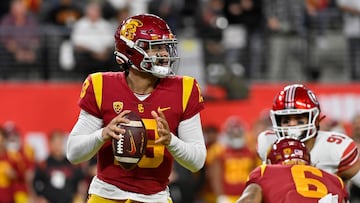Why are college football teams leaving the Pac-12?
The schools that want to leave the conference will not have to pay an exit fee when they depart after the Pac-12′s TV deal expires in 2023-24.


After a seismic conference realignment, what happens to the four remaining Pac-12 members? With five more schools leaving (now eight) in 2024, only Stanford, California, Oregon State, and Washington State remain in the 108-year-old conference.
During media day on July 21, Pac-12 commissioner George Kliavkoff addressed concerns regarding his conference. USC and UCLA had already left, and rumors circulated that Colorado may follow suit as the league struggled to finalize a TV deal.
Apple's primary media rights deal w/Pac-12 expires at end of week, sources told @ActionNetworkHQ. Proposal is in "low $20 million" figure per school/annually, but can fluctuate/increase based on membership size & subscription incentives, sources said
— Brett McMurphy (@Brett_McMurphy) August 3, 2023
Conference realignment continues to dominate college athletics news for the third consecutive summer. The Pac-12 is once again scrambling to adapt after Big 12 co-founders Oklahoma and Texas announced their intent to join the SEC in 2021. In an even more surprising move, USC and UCLA have decided to join the Big Ten in 2022, despite the geographical mismatch.
These sweeping changes, new leadership, and media rights deals have contributed to the Power 5 pecking order. Colorado’s departure has left the Pac-12 in a shaky position.
While it’s unclear how much previous realignment affected Colorado’s decision, the Pac-12′s slow media rights negotiation likely played a significant role.
TV rights = Money
Brett Yormark, who became the Big 12 college athletic administrator on August 1, 2022, quickly prioritized securing the league’s TV deal as his most important task. Under his leadership, the Big 12 landed a six-year, $2.2 billion television agreement with ESPN and Fox through 2031, finishing negotiations before the Pac-12, although Pac-12′s current television deal ends in a year’s time.
On the conference’s good strategic moves, Baylor AD Mack Rhoades told ESPN that the Big 12 was able to improve its national standing due to two key events.
Firstly, in September 2021, the conference announced that Houston, UCF, Cincinnati, and BYU were joining, which helped dispel the narrative that the league was falling apart. Secondly, Yormark negotiated a mutually beneficial media rights deal for the league and its partners before going to market and before the Pac-12.
ACC considering adding Cal, Stanford & SMU or just Cal & Stanford, sources told @ActionNetworkHQ. 1st report by @RossDellenger. SMU has a $10 million exit fee to leave AAC w/less than 27 months notice so that number could double. In May, ACC source told @ActionNetworkHQ league…
— Brett McMurphy (@Brett_McMurphy) August 8, 2023
Related stories
Over the last 15 years, Pac-12 has lagged behind the other Power 5 conferences in media rights deals, including the average annual payout for each school. The conference has not produced a national champion in football since USC in 2003 and 2004 and a College Football Playoff team since Washington in 2016. Similarly, the conference has not produced an NCAA Tournament champion in basketball since Arizona in 1997 and a team that has made the championship game since UCLA lost to Florida in 2006. All these factors also weakened their negotiating position and leverage.
While other factors exist in teams’ exit from the conference, money remains the most pressing issue, particularly regarding Pac-12′s failed attempt to negotiate a lucrative media rights deal, which will probably hunt them and influence their strategic decisions next season.

